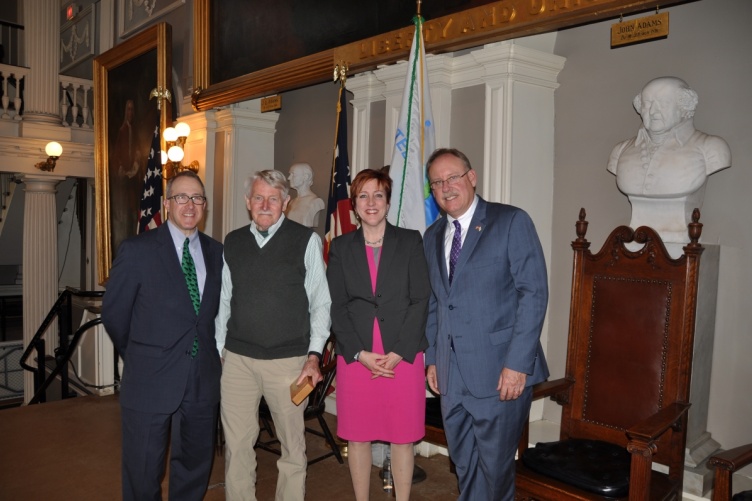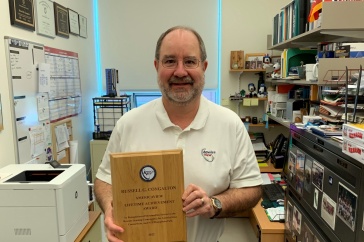
UNH Professor Jim Haney, second from left, was recognized by the U.S. Environmental Protection Agency with a 2016 Environmental Merit Award. Credit: EPA
NH Agricultural Experiment Station researcher Jim Haney, professor of biological sciences in the UNH College of Life Sciences and Agriculture, was recently recognized by the U.S. Environmental Protection Agency with a 2016 Environmental Merit Award. He and other environmental leaders were among three dozen recipients across New England honored for helping to improve New England's environment.
Each year EPA New England recognizes individuals and groups in the six New England states who have worked to protect or improve the region's environment in distinct ways. The merit awards, given out since 1970, honor individuals and groups who have shown particular ingenuity and commitment in their efforts.
"We are proud to honor those citizens, businesses and organizations who have gone the extra mile to help protect and preserve our region's natural resources," said Curt Spalding, regional administrator of EPA's New England office. "These New England award winners are committed to making our towns, cities and countryside of New England healthy, vibrant places with clean air, land and water."
The Environmental Merit Awards, which are given to people who have already taken action, are awarded in the categories of individual; business (including professional organizations); local, state or federal government; and environmental, community, academia or nonprofit organization. Also, each year EPA presents lifetime achievement awards for individuals.
 Haney, who also directs the UNH Center for Freshwater Biology, has spent a majority of his career studying cyanobacteria blooms in bodies of water, an increasing problem in New England and worldwide. These blooms are often caused by nutrient sources in the landscape and may result in dense scums on the water surface that can lead to toxins with implications for human and environmental health.
Haney, who also directs the UNH Center for Freshwater Biology, has spent a majority of his career studying cyanobacteria blooms in bodies of water, an increasing problem in New England and worldwide. These blooms are often caused by nutrient sources in the landscape and may result in dense scums on the water surface that can lead to toxins with implications for human and environmental health.
Haney has been a key member of New England’s regional cyanobacteria monitoring and bloom watch program, which was developed to track harmful cyanobacterial blooms and monitor bloom development. His contributions have been enormous to the success of this program. He has been key in fostering collaboration between nonprofit groups, citizen scientists, boards of health, state water quality scientists, water suppliers and academics.
With his help, new tools are being developed to predict blooms, and approaches are improving to guide public health officials. Haney has fostered the idea of a multi-tiered participatory approach to the regional program. This program has been well received throughout New England, and is being shared nationally. Haney's willingness to share expertise and innovation freely is an example of selfless commitment to public health and the environment.
Founded in 1887, the NH Agricultural Experiment Station at the UNH College of Life Sciences and Agriculture is UNH’s original research center and an elemental component of New Hampshire's land-grant university heritage and mission. We steward federal and state funding to provide unbiased and objective research concerning diverse aspects of sustainable agriculture and foods, aquaculture, forest management, and related wildlife, natural resources and rural community topics. We maintain the Woodman and Kingman agronomy and horticultural farms, the Macfarlane Greenhouses, the Fairchild Dairy Teaching and Research Center, and the Organic Dairy Research Farm. Additional properties also provide forage, forests and woodlands in direct support to research, teaching, and outreach.
-
Written By:
Lori Tyler Gula, PhD | NH Agricultural Experiment Station | lori.gula@unh.edu | 603-862-1452



















































